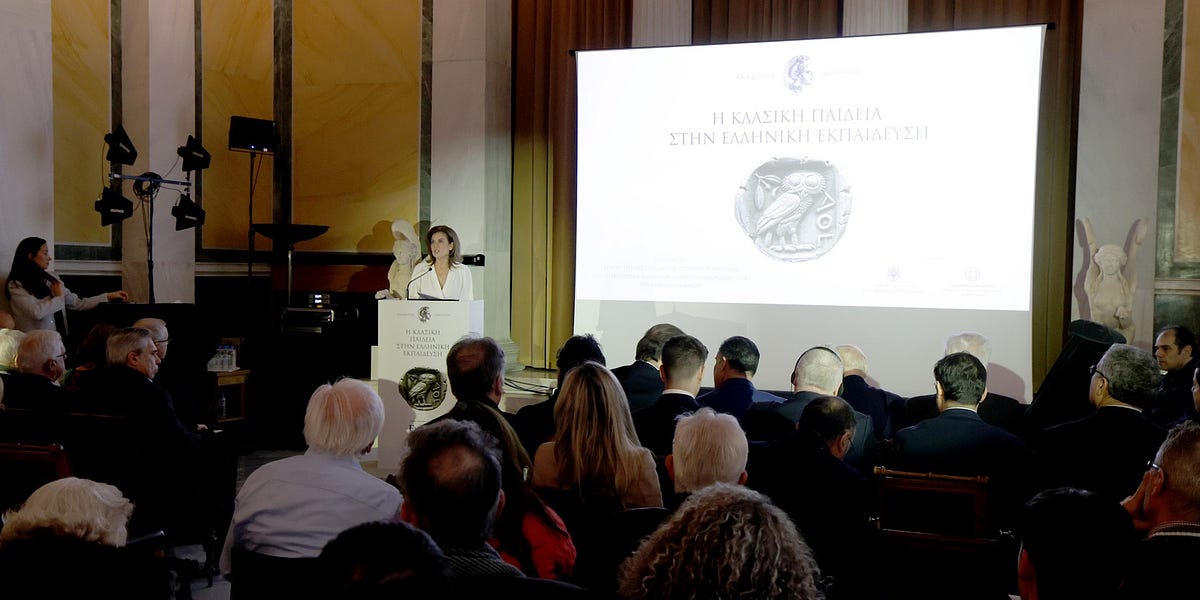by Eugenia Manolidou
The World Greek Language Day was established in 2017 by Professor Giorgos Korinthios to coincide with the anniversary of the death of Dionysios Solomos on February 9th. This day was instituted to honor the Greek language as a cultural treasure and a pillar of civilization, thought, and history in the Western world. Through this commemoration, we acknowledge the significance of the Greek language both as a tool for recording knowledge and as a means of preserving global heritage. This year’s celebration provided a valuable opportunity to highlight the Greek language and the challenges associated with its teaching in modern times.
On February 7, 2025, the “Center for Research in Greek and Latin Literature” of the Academy of Athens organized an exceptional symposium entitled “Classical Education in Greek Schools” to honor World Greek Language Day. The event brought together distinguished professors from Greece and abroad, who discussed crucial issues surrounding the teaching of the Greek language, emphasizing the necessity of experiential learning approaches and the modernization of instruction.
The Minister of Education and Religious Affairs, Kyriakos Pierrakakis, delivered opening remarks, underscoring the national and international significance of the Greek language and highlighting the need for its pedagogical renewal. On behalf of His Beatitude the Archbishop of Athens, Archimandrite Father Isidoros Katsos expressed his support for the preservation and promotion of Greek as a vehicle for intellectual development and cultural continuity.
Sophia Papaioannou, Vice-Rector of the National and Kapodistrian University of Athens, spoke about the importance of classical education in the learning process. Meanwhile, the President of the Academy of Athens, Michael Tiverios, emphasized the necessity of strengthening the humanities, which contribute to the intellectual and social progress of humanity. Antonios Regakos, President of the Center for Latin Philology, addressed the challenges and opportunities presented by the teaching of classical languages in the modern world.
The symposium featured presentations by scholars from Greece and abroad, each exploring different aspects of classical education. Mauro Agosto from the Pontificia Università Lateranense discussed the successful implementation of Classical Lyceums in Italy, while Steven Hunt from the University of Cambridge and Joseph Conlon from Ralston College, USA, examined the experiential teaching of Ancient Greek in their respective countries. Maria Efthymiou, professor of History, highlighted the enduring significance of the Greek language as a medium for preserving and transmitting Greek history and thought.
Giannis Kargakos, philologist at Arsakeio School, reflected on the challenges faced by the Greek education system in its efforts to maintain classical education. Sophia Goula from the School of Ancient Greek “Elliniki Agogi” presented an experiential teaching method for elementary school students, emphasizing the importance of early exposure to Ancient Greek.
Christoforos Charalambakis, academic and emeritus professor of linguistics at the University of Athens, stressed the need to reinforce classical education in schools. Georgia Xanthaki-Karamanou, professor at the University of the Peloponnese and president of the Hellenic Philological Society, proposed strategies for upgrading classical education in Greek schools. Evangelos Alexiou from Aristotle University of Thessaloniki discussed the connection between ancient authors and contemporary thought, emphasizing the significance of teaching classical texts.
Nikoletta Kokosiouli, philologist and representative of the Paideia Institute, presented modern methodologies for teaching Ancient Greek, highlighting the importance of experiential approaches in helping students internalize the language. Giannis Mastrogeorgiou, historian, examined the role of classical education in the era of Artificial Intelligence, emphasizing the relevance of humanities and their intersection with contemporary technology. Giorgio Filieri, professor of the Greek dialect “Griko” from Sternatia, Italy, discussed the spread of the Greek language and ongoing efforts to preserve the Griko dialect in Greek-speaking villages of Southern Italy, underscoring the value of maintaining linguistic traditions as part of the broader Greek heritage.
The symposium concluded with a moving performance by students of the School of Ancient Greek “Elliniki Agogi”, who, accompanied by the ancient lyre of Nikos Xanthoulis, honored the continuity of the Greek language by presenting it through ten historical periods, from Homer to Elytis.
Educators from across Greece, Europe, the United States, Uruguay, and China attended the event online, affirming the global significance of the Greek language and classical education. The symposium underscored the enduring appreciation for the Greek language and the urgent need to revitalize classical education within the school system.
On a personal note, I feel deeply honored to have organized and coordinated this event. I extend my sincere gratitude to Professor Michael Tiverios, President of the Academy of Athens, and Professor Antonios Regakos, Secretary for Publications, for entrusting me with the opportunity to contribute to this important initiative. Their collaboration and support were instrumental in ensuring the symposium’s success. Finally, I wish to thank all the professors and colleagues whose invaluable contributions made this event possible.
Our language is both our pride and our foundation. It is our duty to support it now, as it has supported us through the centuries.
“I know of only one language—the unified Greek language, as it evolved from Ancient Greek—which has become our great pride and our steadfast pillar.”
— Odysseas Elytis.
